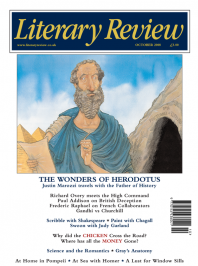Nigel West
Smoking Gun
The Sixth Man
By James McNeish
Quartet Books 414pp £25
The original five of the notorious Cambridge spies, Guy Burgess, Donald Maclean, Kim Philby, Anthony Blunt and John Cairncross, are now fairly familiar, but the name of the New Zealander Paddy Costello is probably not. He was a Russian-speaking, Trinity College, Cambridge-educated soldier, diplomat and academic on the political left whose son Mick became a leading figure in the ill-fated, Kremlin-backed Communist Party of Great Britain. However, in 1981, seventeen years after his death in Manchester, Paddy Costello was linked to espionage by an assertion in Chapman Pincher’s Their Trade is Treachery that MI5 had believed Costello to have been a fully-fledged Soviet mole. According to Pincher, who had received his information from his covert co-author, the renegade self-styled MI5 spycatcher Peter Wright, Costello had been spotted communicating with a Soviet intelligence officer while under surveillance, had acted as a letter-box for the wife of a Swedish spy and, most significantly, in May 1954 had issued authentic New Zealand passports to Morris and Lona Cohen, a pair of KGB illegals who were subsequently arrested in London and sentenced in March 1961 to long terms of imprisonment for breaches of Official Secrets Acts. At the time he had issued them, according to Wright (who failed to repeat his allegation in Spycatcher in 1987), Costello had been working at the tiny New Zealand legation in Paris, staffed by just three people, and had broken the rules to mail the two passports to the Cohens, who were then masquerading as Peter and Helen Kroger and claiming to be in poor health in an Austrian spa.
In The Sixth Man, which is a curious title considering the content, James McNeish, a New Zealand academic, seeks to debunk the charges against Costello. The author omits to mention the first two claims made about Costello and instead concentrates on the circumstances in which the Cohens received their passports,

Sign Up to our newsletter
Receive free articles, highlights from the archive, news, details of prizes, and much more.@Lit_Review
Follow Literary Review on Twitter
Twitter Feed
How to ruin a film - a short guide by @TWHodgkinson:
Thomas W Hodgkinson - There Was No Sorcerer
Thomas W Hodgkinson: There Was No Sorcerer - Box Office Poison: Hollywood’s Story in a Century of Flops by Tim Robey
literaryreview.co.uk
How to ruin a film - a short guide by @TWHodgkinson:
Thomas W Hodgkinson - There Was No Sorcerer
Thomas W Hodgkinson: There Was No Sorcerer - Box Office Poison: Hollywood’s Story in a Century of Flops by Tim Robey
literaryreview.co.uk
Give the gift that lasts all year with a subscription to Literary Review. Save up to 35% on the cover price when you visit us at https://literaryreview.co.uk/subscribe and enter the code 'XMAS24'